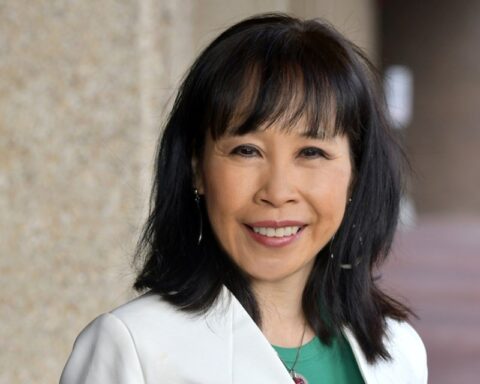Only eight per cent of the jobs in Canada are advertised. An astounding 76 per cent of the jobs are hidden or created. New Canadians packed into a Metro Toronto Convention Centre conference room to gain this type of insight about the Canadian job market from human resources professional, Sujay Vardhmane.
Vardhmane’s presentation, Winning Ways – The Formula to Your Job Search Success, is just one of nine interactive speaker sessions part of a free, day-long Career, Education & Settlement Fair presented by Canadian Immigrant Magazine in partnership with Scotiabank and Centennial College. The annual fair, which also includes a trade show, resume clinic and speed mentoring sessions, is in its fourth year. Gautam Sharma, Publisher of Canadian Immigrant, says its goal is to provide real advice to newcomers. “The idea was to have a very sort of holistic opportunity for everyone to listen to,” he says.
Vardhmane’s main message during an hour-long presentation is that sitting behind a computer sending resumes all day long will rarely lead to securing a job. He gives newcomers a challenge: for six months, give yourselves points for every job-related action they take – 500 for an interview, 250 for an information meeting, 100 for making a phone call and 50 for applying for a job via the internet. If someone achieves 3,000 or more points weekly for six months he is confident they will land their ideal job.
Ozzie Saunds, of ResumeToronto.ca, was on hand at the 4th Annual Career, Education & Settlement Fair held at the Metro Toronto Convention Centre on July 8. A graduate of the University of Toronto in Employment Relations, Saunds is a nationally recognized resume expert. Here are some of his key pieces of advice to new Canadians when writing their resume and preparing for an interview.
Quantify Your Accomplishments: “The name of the company and who you worked for is not that important, what is important is that whoever you worked for, you’re describing your accomplishments, and any time you can quantify your accomplishments, that’s what’s going to dramatically win you interviews.”
Understand the Job Market Demands: “Unfortunately the realistic situation is you’re coming to Canada, it’s going to be tough for you to get a job at the senior management or the same level that you got back home. You may have a title back home such as senior executive, such as CEO, such as CFO and then someone’s going to look at that resume and say you’re over-qualified for this job in Canada. So one of the things that you want to do is use those job titles that describe you as entry to mid-level unless you know you have a skill that’s in high demand – find out what those high in demand skills are in Canada.”
Know the Canadian Way: “I see a lot of stuff like pictures from newcomers, date of birth, marital status, a lot of that stuff is required information for example in the Middle East, but that same information in Canada some human resources managers won’t even look at it because they’re afraid of discrimination laws and they can’t look at it even if they wanted to.”
Continuously Improve: “The best advice I can give you is, you do need to make an effort to improve [your English], whether it’s having more English-speaking friends, watching TV in English, reading … the number one question that a lot of recruiters ask when looking at job candidates or when checking references is communication skills. And, if their communication skills are not good, they won’t get the job.”
Relationships Lead To Referrals: “It’s okay to talk about non-Canadian experience [on a resume]. At the same time, while they have that non-Canadian work experience they should be on LinkedIn building relationships … they have to work on networking, knowing more people, making sure they participate in any type of free new Canadian employment service. Because, of one of the easiest ways to get a job is by getting referred.”
But many of the attendees, who face barriers such as not knowing the language, not knowing anyone in Canada, and not having any Canadian work experience, may find his challenge daunting. Having immigrated to Canada in 2002 from India himself, Vardhmane can empathize with these struggles.
“[New Canadians often] develop a very negative mindset very early on that I’m a loser, I’m a victim and everyone is treating me badly,” he explains. “What you may find surprising is this, every person at every stage in life has challenges in a job search, I could be a white male who is 45, I will have some challenges in my job search, I could be a 60-year-old, I could be a 20-year-old I could be having challenges, whether I’m born here or not born here. But what tends to happen is we tend to look at it this way, I’m new in this country and I’m being penalized because of that.”
[New Canadians often] develop a very negative mindset very early on that I’m a loser, I’m a victim and everyone is treating me badly.”
During his workshop, Vardhmane shares that he has never been hired in Canada for a job that he has applied to in the traditional way of e-mailing a resume and cover letter. Rather, the opportunities that have come his way (he is also a part-time professor at Centennial, Seneca and George Brown colleges and the University of Toronto), have been because of relationships he’s built over time and networking.
“I think listening to people and positioning myself professionally with people [is why] people were willing to help me,” he shares, reminiscing about his early days in Canada. “Consistency of behaviour is very critical for people to be comfortable to refer you.”
In May 2002, when Sujay Vardhmane arrived in Canada from India, he had a burning desire within him to achieve success as he defined it. And he wasn’t settling for any less. Twelve years later, Vardhmane is working as the Senior Manager of Global Employment Strategies at Scotiabank. He employed key strategic principles in his job search, which he candidly shared with New Canadian Media.
Adapt to Survive – “[Some newcomers take] the approach they would in their country of origin when job searching and the approach in Canada is very different so those who understand it and make that transition quickly are the ones that see success come in quicker.”
Brand Yourself – “Most newcomers tend to believe that their resume tells the whole story of who they are and what they’ve done. The resume is only the tip of the iceberg … For example, a simple question, tell me what your strengths are, very often a newcomer would say, “Well I’m educated, I’ve worked, I’ve done these type of things,” which focuses on the very hard skills. Where very often we’re expecting, “I’m personable, I’m good with people,” all of that. We don’t use that vocabulary at all, nor do we position that as a strength, so that’s again something they’re challenged with.”
Learn How Things Work – “If you don’t invest your time to understand how it works, then you will not know how to get ahead. You do that by talking to people, listening to people, it could be anyone, it could be someone who’s new to the country or someone who’s been here for a long time, you meet them at a store, talk and get to know them.”
Go Beyond Your Own People – “We tend to gravitate towards our comfort zone, whether it’s our own ethnic group or various other groups and we think it’s only people of those groups that will help us. We’ve chosen to come to a country that’s multicultural and diverse, and if we limit ourselves to our own pockets and silos then we’re limiting our own potential and opportunities.”
Be Flexible – “We are limiting ourselves. What we don’t understand is it’s not what we’ve done, but what competencies are needed for us to be successful … It’s like I’m an HR (Human Resources) professional, I only want an HR job, and well the first job I got was teaching in HR, what’s wrong with that? Take it. Rather than have a closed mind to that.”
Networking was stressed throughout the day as the number one most important thing newcomers must do to achieve whatever success they are pursuing. Corporate trainer, career specialist and workplace coach, Colleen Clarke, emphasizes this in her workshop, Networking How To Build Relationships That Count. She says newcomers should start the process even before they set foot on Canadian soil.
“I had a client a few years ago, he’s become a huge success here. Before he came to Canada – he knew he was immigrating here – we worked together long distance,” she shares. “He came here with the names of 20 people to contact of people back in Mumbai who knew people in Toronto. So when he came to Toronto he already had 20 phone numbers from the people in Mumbai who had family or relatives here.”
“Consistency of behaviour is very critical for people to be comfortable to refer you.”
Upon arriving in Canada, continue connecting with the people who you know from your day-to-day life, she adds. “Try to start with people that you know. Your bank teller, your hair dresser, the people within your own ethnic community, your children go to school, you must know some of the parents of the children.”
She closes by reminding attendees that it isn’t the first person they network with that will give them a job, but by building strong, positive relationships with several people, through the ideology of “six degrees of separation” where someone knows someone who knows someone, job referrals can and will happen.





